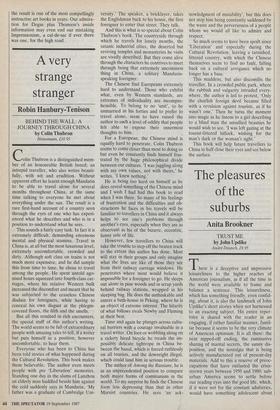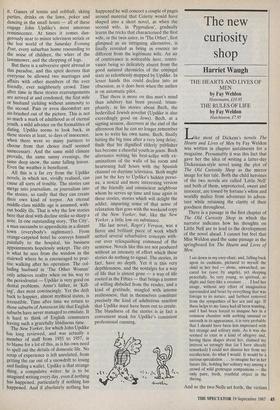The pleasures of the suburbs
Anita Brookner
TRUST ME by John Updike
Andre Deutsch, f9.95
There is a deceptive and impressive leisureliness to the higher reaches of American journalism, as if all the time in the world were available to frame and balance a sentence. This leisureliness, which has something friendly, even confid- ing, about it, is elso the landmark of John Updike's short stories when not harnessed to an exacting subject. His entire reper- toire is shared with the reader in an engaging, if rather familiar manner, famil- iar because it seems to be the very climate of American optimism. It is all there: the neat nipped-off ending, the ruminative sharing of marital secrets, the sunny dis- position, and the nostalgia that is being actively manufactured out of present-day materials. Add to this a reserve of preoc- cupations that have outlasted the crisis- strewn years between 1950 and 1980: sub- urban America seems to settle before our reading eyes into the good life, which, if it were not for the constant adulteries, would have something adolescent about
it. Games of tennis and softball, skiing parties, drinks on the lawn, poker and dancing in the small hours — all of these engage John Updike's most amorous reminiscence. At times it comes dan- gerously near to minor television serials or the lost world of the Saturday Evening Post, every suburban home resounding to the noise of children, the whirr of the lawnmower, and the chopping of logs.
But there is a subversive spirit abroad in this paradise, and this spirit decrees that everyone be allowed two marriages and affairs with other members of the ever friendly, ever neighbourly crowd. Time after time in these stories rearrangements are arrived at and condoned, the first wife or husband yielding without animosity to the second. Pain or even discomfort are air-brushed out of the picture. This is not so much a mark of adulthood as of eternal youth, a mild advance on the formalities of dating. Updike seems to look back, in these stories at least, to days of innocence, when there were so many partners to choose from that choice itself seemed unnecessary. And the same mild climate prevails, the same sunny evenings, the same deep snow, the same falling leaves. Even the weather is beneficent.
All this is a far cry from the Updike novels, in which sex, vividly realised, can cause all sorts of trouble. The stories can merge into journalism, or journalism into the stories, so easily that they can create their own kind of torpor. An eternal middle-class middle age is assumed, with- out bodily ills. That is why the few stories here that deal with decline strike so sharp a note. In one outstanding story, 'The City', a man succumbs to appendicitis in a distant town (everybody's nightmare). From orange-carpeted hotel he conveys himself painfully to the hospital, his business appointments hopelessly unkept. The city is what he sees from the window in the stairwell where he is encouraged to prac- tise walking after his operation. The col- luding husband in 'The Other Woman' only achieves reality when on his way to the periodontist — Updike is very good on dental problems. Anne's father, in 'Kill- ing', dies most convincingly. Yet the drift back to happier, almost mythical states, is irresistible. Time after time we return to those suburbs of American life that English suburbs have never managed to emulate. It is hard to think of English commuters having such a gracefully libidinous time. The New Yorker, for which John. Updike has long reviewed, and was actually a member of staff from 1955 to 1957, is to blame for a lot of this, as is his own need to spell out the details of domestic life. No scrap of experience is left unrelated, from getting the car out of a snowdrift to losing and finding a wallet. Updike is that strange thing, a compulsive writer: he is to be Imagined writing every day, even if nothing has happened, particularly if nothing has happened. And if absolutely nothing has happened he will concoct a couple of pages around material that Colette would have shaped into a short novel, as when the second wife, in 'Pygmalion', gradually learns the tricks that characterised the first wife, or the twin sister, in 'The Other', first glimpsed as an intriguing alternative, is finally revealed as being in essence no different from the legitimate wife. An air of contrivance is noticeable here, contri- vance being so delicately absent from the good natured chronicles of the conjugal state so relentlessly mapped by Updike. In lesser hands this could decline into an obsession, as it does here when the author is on automatic pilot.
That there is more on this man's mind than adultery has been proved, trium- phantly, in his stories • about Bech, the bedevilled Jewish' novelist (Updike is also exceedingly good on Jews). Bech, at a signing session, discovers at the end of the afternoon that he can no longer remember how to write his own name. Bech, finally hitting the big time after a very long delay, finds that his dignified elderly publisher has become a cheerful youth in jeans. Bech alternates writing his best-seller with ex- aminations of the walls of his room and heartening half hours with the Spanish channel on daytime television. Both might just be the key to Updike's hidden perso- na, a stoical and more interesting version of the friendly and omniscient neighbour whom he serves up time and time again in these stories, stories which will delight the addict, imparting some of that sense of relaxation that goes with the weekend copy of the New Yorker, but, like the New Yorker, a little low on substance.
His last novel, Roger's Version, was a fierce and brilliant piece of work which netted several rebarbative concepts with- out ever relinquishing command of the sentence. Novels like this are not produced without an intensity of effort which these stories do nothing to signal. The stories, in fact, have no depth. Yet it is this very depthlessness, and the nostalgia for a way of life that is almost gone — a way of life rooted in the Fifties — that brings a tremor of willing disbelief from the reader, and a kind of gratitude, mingled with intense restlessness, that in themselves constitute precisely the kind of adulterous reaction that Updike must have been out to create. The blandness of the stories Is in fact a convenient mask for Updike's consistent professional cunning.



































































 Previous page
Previous page